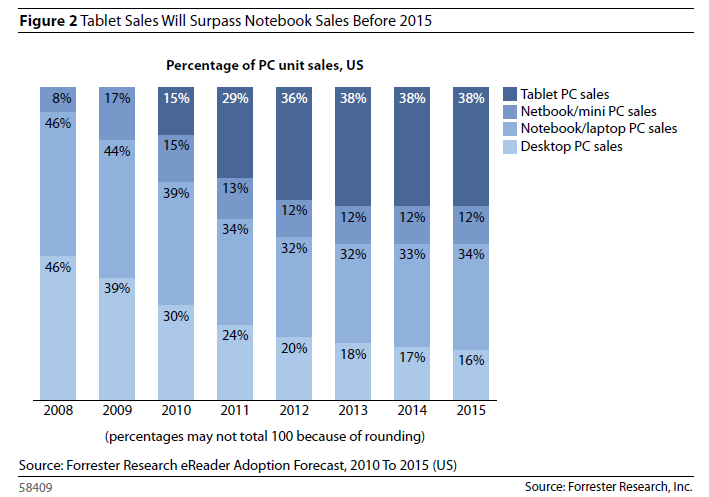Forrester: Line between apps and browsers blurring with tablets

On the eve of Microsoft's expected tablet/slate strategy unveiling at the Consumer Electronics Show, Forrester Research has published updated hardware and software predictions for the tablet market.
In a January 4 research note entitled "Tablets Will Grow As Fast As MP3 Players," Forrester is predicting that the U.S. market for tablets will grow from 10.3 million units sold in 2010 to 44 million new units sold in 2015. By 2015, 82 million people here in the States will own a tablet, according to Forrester. Forrester is predicting a "substantial number" of consumers will be willing to buy new, upgraded tablets with every new model release.
(click on image above to enlarge)
Forrester is predicting that tablet sales here in the U.S. will eclipse laptop sales in the coming years, but laptops will still outnumber tablets. The "ultra-portable" category of laptops will remain strong, Forrester is predicting. Netbooks, meanwhile, will continue to grow modestly (with Forrester revising its U.S. market estimate of 15.3 million units sold in 2015 to 14.2 million).
Forrester's report also describes the confusing space into which Microsoft and its partners are launching Windows slates and tablets. While app stores are the way that current iPad and Galaxy Tab users are obtaining their content, the line between apps and browsers is collapsing, Forrester notes. From the report:
"There are multiple scenarios in which consumers will use a tablet browser instead of an app, even if an app is available. For example, they may not interact frequently enough with the brand or feel passionately enough about the brand to justify the effort to seek out an app (free or paid), or they may have a goal that the app does not support, such as account self-service in a magazine-reading app. In addition, consumers may be justifiably ignorant as to when they are in the browser — searching on the ABC News iPad app, for example, launches the Safari browser from within the app, blurring the line between app and browser."
Some pretty substantial changes on the browser front will have to happen for Windows (as well as iOS and Android) to become a great tablet/slate operating system. From the report:
"Tablet browsers require Web sites that are distinct from 'mobile' sites and distinct from the PC-browser-accessed Web. Individual product strategists are working to solve this problem, as they should, for their own Web properties. But a more automated tool would help even more: A product that automates optimization for touchscreen tablet browsers would serve a growing need in the market."
Microsoft is believed to be optimizing Windows 8 for slates and creating an app store model for those devices. But by late 2012/early 2013, will the app store model still be viable? What will the role of Silverlight (and HTML5) be in the Windows 8 world? Lots of questions... and I'm not so optimistic we'll be getting (m)any real answers this week at CES....
